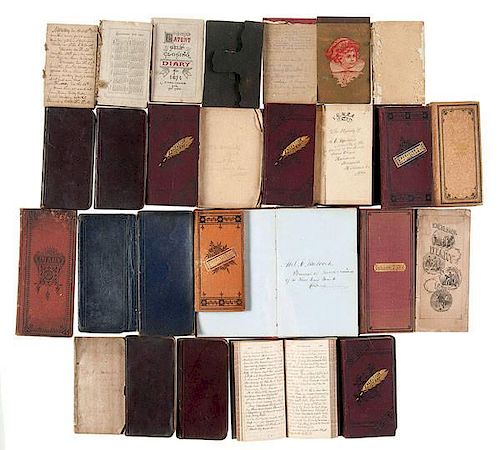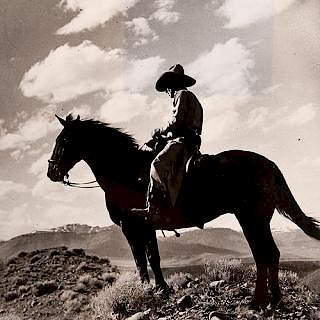California Gold Rush Journal of Abel E. Babcock, Plus 26 Subsequent Diaries
About Seller
6270 Este Ave.
Cincinnati , OH 45232
United States
With offices in Cincinnati, Cleveland and Denver, Cowan’s holds over 40 auctions each year, with annual sales exceeding $16M. We reach buyers around the globe, and take pride in our reputation for integrity, customer service and great results. A full-service house, Cowan’s Auctions specializes in Am...Read more
Two ways to bid:
- Leave a max absentee bid and the platform will bid on your behalf up to your maximum bid during the live auction.
- Bid live during the auction and your bids will be submitted real-time to the auctioneer.
Bid Increments
| Price | Bid Increment |
|---|---|
| $0 | $25 |
| $500 | $50 |
| $1,000 | $100 |
| $2,000 | $250 |
| $5,000 | $500 |
| $10,000 | $1,000 |
| $20,000 | $2,500 |
| $50,000 | $5,000 |
| $100,000 | $10,000 |
About Auction
Jun 12, 2015 - Jun 13, 2015
Cowan's Auctions dawnie@cowans.com
- Lot Description
27 personal, handwritten diaries that present a unique historical record of 19th century America, covering a period of 49 years, 1852-1900. The diaries contain over 7000pp that relate in daily detail the life and times of minister, Abel E. Babcock.
A profoundly significant faith in God and love of his family sustained Abel Babcock through brutal sea voyages, the perilous goldfields of 1852, 1853 and 1854 California, to the rural town of Jonesville, Michigan. Golden State riches proved elusive but the wealth of experiences garnered from his 3 year journey energized his life’s vocation of enriching the hearts and souls of his congregations. A more glaring contrast could hardly be found between the gold addicted volatility of California and the sedate predictability of Hillsdale County, Michigan.
Babcock left Litchfield, Michigan, December 31st, 1851…To take the last farewell of all that is dear was truly trying yet we committed all into the hands of him who never leaves nor forsakes those who trust in him. After a long journey by stage coach to Dunkirk, New York, there were no beds to be had…Most spent the night drinking swearing and dancing . . . . . anything but agreeable especially for Sabbath. After a train journey through New York State, the NY&ER Railroad delivered Babcock to New York City. The travelers were . . . put up at Heath’s Hotel with many others who are on the road to California…Men of all nations as well as occupations are here and hundreds that are bound for California.
The Steam Ship Ohio, bound for the Atlantic [ eastern ] Coast of Panama was boarded at 2:00 PM. The curse of seasickness struck many of the 700 to 800 passengers. Entering the Gulf Stream, Babcock noticed immediately how much warmer it was and writes of seeing Flying Fish for the first time on Jan. 15th, 1852. Soon the Ohio passed the mountainous Island of St. Domingo. The captain put an end to card playing on the Sabbath. The Ohio landed at Chagres. A walking and canoe journey with baggage was required for the travelers to cross Panama…Intolerable hot . . . . . road [ a 70 mile trail ] very uneven . . . . not a cool breeze . . . nor a drop of cool water to be found. Babcock describes the natives . . . both sex seem to run together very much like the cattle. The commodity of virtue is little known here. There has been here today a bull fight and cock fighting.
Babcock boarded the American sailing bark Philena, which he describes as small and old with many more passengers than can be accommodated very well. Babcock preached on board the ship . . . . all but the Catholics gave good attention. The drinking water was getting bad and . . . had to take the mold off the bread to eat it. Many people were sick and one man was delirious with Yellow Fever. A young man was bled to quiet him and in ½ hour he is truly quiet for he is dead. The man was buried at sea and the author states, it is the most solemn sight in my life. Shortly thereafter the ship steward also died. Babcock would witness several more sea burials before reaching California. Several times becalmed, with low water and provisions, the ship put into Puntarenas, Costa Rica. Without money for port charges or provisions the ship was unable to leave. Two collections were solicited from the passengers and the captain’s gold watch was added to the total pot and after 14 days the Philena sailed for California. Babcock states that the ship leaks quite bad and must be pumped every 2 hours. He decries the drunkenness, rowdyism, and quarreling common among the voyagers and crew . . . most nights all night. Fifty days out of Panama the erratic effects of wind, weather and currents on sailing ships have placed Babcock 400 miles south of Acapulco which is not quite half way to San Francisco. Another entry on March 27 . . . perfect bedlam here last night caused by the free use of liquor. . . the captain and many of the passengers were the worse for drink. So we had . . .Drinking, Cursing and Swearing together with all manner of filthy conversation and plenty of quarreling to fill the picture. A day or two later, 2 men . . . soon die and be launched into the deep. At long last Acapulco, Mexico was Babcock’s next port of call.
Having arrived a few days ahead of Easter, a huge local pageant depicting the death of Christ on Good Friday greatly impressed Babcock. As a staunch protestant he was hesitant to bestow positive credit on any Catholic event but writes…my mind was very much affected on the occasion. Fourteen days passed in the port of Acapulco during which the captain, crew and many passengers remained in a constant state of drunkenness. Serious and sober passengers desired to continue their journey to California on another ship. They asked Babcock to present their case to the American Consul. Babcock and others succeeded in booking passage on the Steamer Winfield Scott. Pacific Ocean waves, bad food and bad water conspired to again present Babcock and many others with painful diarrhea. At long last, after a 4 month trek by train, stage coach, Steamer Ohio, canoe, Sailing Barque Philena and Steamer Winfield Scott - Babcock landed on the shore at San Francisco, California.
The brief description of his tumultuous journey just provided is but a small sample of the adventures Abel Babcock experienced and endured in California. A man stabbed to death the night previous was laid out on the planked side walk while another body was retrieved from San Francisco Bay – another murder victim…The greed for gold will cause men to do anything…he writes as these events occurred on his first day in California. Within a few hours Babcock left for Sacramento, which was the center of gold mining territory. Having heard of success at Mud Springs – Babcock walked the 44 miles from Sacramento. An entire day’s hard labor earned $1.75. Prospecting at Coon Hollow earned the following daily wages: $1.27, $4.12, 56c, $1.39…Discouraging in the land of gold. He heard of a Michigan native who had died of Typhoid Fever. Babcock notes . . . all excitement as Indians have killed one Chinaman and wounded 4 others . . . miner’s blood is up and they have captured an Indian . . . a man was dispatched for the Sheriff but before he returned the Indian was delivered to the Chinamen and soon he was hanging to the limb of a tree . . . the Indian was buried but later he was dug up by the Indians taken to the tribe and his body burned.
Babcock recounts a prospecting journey in which he saw country he describes as having terrible convulsions. Most likely this was his first sight of land shattered by earthquakes. In another first experience . . . saw a man use a lasso to catch a horse. A while later he comments After mature reflection have decided to try my luck in the city. Babcock got a job making picks in a blacksmith shop, earning $4.00 per day plus board. He relates a celebration parade of Masons on St. John’s Day, a negro man shot by a woman of his own race, and a duel fought with rifles to satisfy wounded honor – no notice of it taken by officers of the law for it was an affair of honor. He notes a huge wake and sincere mourning in California at the death of Henry Clay, One of America’s noble son’s. A huge fire destroyed every house in Sacramento including the Golden Eagle Hotel where Babcock was employed as a carpenter. The fire forced him to live in a tent…A number of Chinese women have come here to tarry and establish a house of ill fame. Men have paid more attention to the Chinese prostitutes than their business.
While the adventures were many and the experiences were rich, Babcock perceived the toll taken on men in the pursuit of California’s gold…There are many about whose reason has failed them and they wander about as confirmed maniacs . . . . others put an end to a miserable existence by committing suicide. . . .others resort to the intoxicating cup in hopes of drowning trouble.
After mature consideration in November, 1854, Babcock decided to return to all that was near and dear to him in Michigan. Overcoming another perilous sea voyage – It looks as though we shall all go to the bottom - he was then reunited with his loving wife and children. He continued the diaries, which daily chronicle the events of his life. In later entries, he comments on the conclusion of the Civil War and the death of Lincoln…A nation mourns as no other nation has ever mourned.
Following the physical and emotional roller coaster of 1850s California, Babcock was content with the measured consistency of preaching, planting and providing for his family. He continued his daily chronicles through 1900. - Shipping Info
-
SHIPPING. At the request of the buyer, Cowan's will authorize the shipment of purchased items. Shipments usually occur within two weeks after payment has been received. Shipment is generally made via UPS Ground service. Unless buyer gives special instructions, the shipping method shall be at the sole discretion of Cowan's Auctions, Inc.. Cowan's is in no way responsible for the acts or omissions of independent handlers, packers or shippers of purchased items or for any loss, damage or delay from the packing or shipping of any property.
-
- Buyer's Premium



 EUR
EUR CAD
CAD AUD
AUD GBP
GBP MXN
MXN HKD
HKD CNY
CNY MYR
MYR SEK
SEK SGD
SGD CHF
CHF THB
THB











